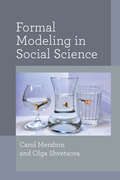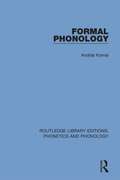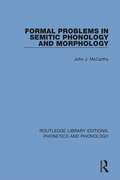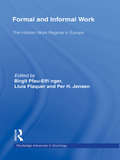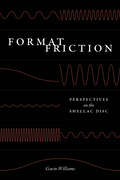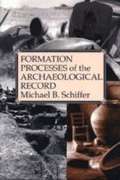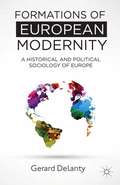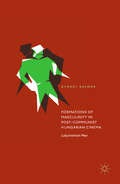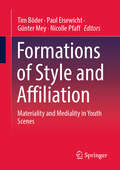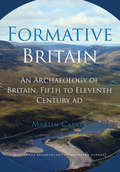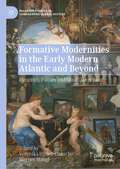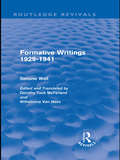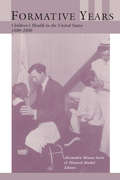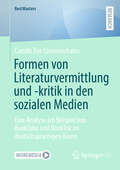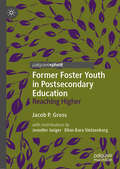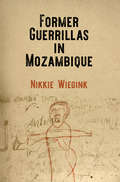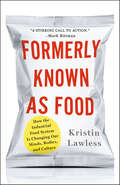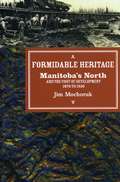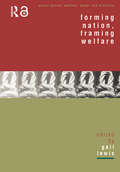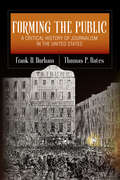- Table View
- List View
Formal Modeling in Social Science
by Carol Mershon Olga ShvetsovaA formal model in the social sciences builds explanations when it structures the reasoning underlying a theoretical argument, opens venues for controlled experimentation, and can lead to hypotheses. Yet more importantly, models evaluate theory, build theory, and enhance conjectures. Formal Modeling in Social Science addresses the varied helpful roles of formal models and goes further to take up more fundamental considerations of epistemology and methodology. The authors integrate the exposition of the epistemology and the methodology of modeling and argue that these two reinforce each other. They illustrate the process of designing an original model suited to the puzzle at hand, using multiple methods in diverse substantive areas of inquiry. The authors also emphasize the crucial, though underappreciated, role of a narrative in the progression from theory to model. Transparency of assumptions and steps in a model means that any analyst will reach equivalent predictions whenever she replicates the argument. Hence, models enable theoretical replication, essential in the accumulation of knowledge. Formal Modeling in Social Science speaks to scholars in different career stages and disciplines and with varying expertise in modeling.
Formal Peace and Informal War: Security and Development in Congo (Routledge Explorations in Development Studies)
by Zoë MarriageNorthern interventions into African countries at war are dominated by security concerns, bolstered by claims of shared returns and reinforcing processes of development and security. As global security and human security became prominent in development policy, Congo was wracked by violent rule, pillage, internal fighting, and invasion. In 2002, the Global and All-Inclusive Peace was promoted by northern donors, placing a formal peace on the mass of informalised wars. Formal Peace and Informal War: Security and Development in Congo examines how the security interests of the Congolese population have interacted with those of northern donors. It explores Congo’s contemporary wars and the peace agreed on in 2002 from a security perspective and challenges the asserted commonality of the liberal interventions made by northern donors. It finds that the peace framed the multiple conflicts in Congo as a civil war and engineered a power-sharing agreement between elite belligerents. The book argues that the population were politically and economically excluded from the peace and have been subjected to control and containment when their security rests with power and freedom.
Formal Phonology (Routledge Library Editions: Phonetics and Phonology #14)
by András KornaiThis work, first published in 1995, is primarily addressed to phonologists interested in speech and to speech engineers interested in phonology, two groups of people with very different expectations about what constitutes a convincing, rigorous study. The subject matter, the application of autosegmental theory for Markov modeling, is technical, but not really esoteric – autosegmental theory is at the core of contemporary phonology and Markov models are the main tool of speech recognition. Therefore, it is hoped that anyone interested in at least one of these two fields will be able to follow the presentation.
Formal Problems in Semitic Phonology and Morphology (Routledge Library Editions: Phonetics and Phonology #17)
by John J. McCarthyFirst published in 1985. Two basic issues figure in this study. The first concerns the representation of syllabic and accentual structure, and the effects of those structures on the formulation of phonological rules. In the second section of this title, a solution to the traditional problem of the root and pattern morphological system of Semitic is proposed and illustrated by an extensive treatment of Classical Arabic. This title will be of particular interest to students of linguistics.
Formal and Informal Work: The Hidden Work Regime in Europe (Routledge Advances in Sociology)
by Birgit Pfau-EffingerInformal work – family care, voluntary work, and undeclared or unregulated work – is a critical form of labor in today’s economy, yet remains underanalyzed and examined. This volume develops a comprehensive conceptual framework of informal work and analyses systematically the relationship of formal and informal work. Using a coherent theoretical and methodological approach, this volume explores informal and formal work in six countries and contributes to our empirical knowledge of informal work and its different interrelations with formal work in various societies. A landmark study in the analysis of work, the book demonstrates how the relationship of formal and informal work is developing, how this can be explained in the specific context of the arrangement of work and welfare, and in which ways informal work possibly contributes to social integration and social cohesion.
Format Friction: Perspectives on the Shellac Disc (New Material Histories of Music)
by Gavin WilliamsThe first book to consider the shellac disc as a global format. With the rise of the gramophone around 1900, the shellac disc traveled the world and eventually became the dominant sound format in the first half of the twentieth century. Format Friction brings together a set of local encounters with the shellac disc, beginning with its preconditions in South Asian knowledge and labor, to offer a global portrait of this format. Spun at seventy-eight revolutions per minute, the shellac disc rapidly became an industrial standard even while the gramophone itself remained a novelty. The very basis of this early sound reproduction technology was friction, an elemental materiality of sound shaped through cultural practice. Using friction as a lens, Gavin Williams illuminates the environments plundered, the materials seized, and the ears entangled in the making of a sound format. Bringing together material, political, and music history, Format Friction decenters the story of a beloved medium, and so explores new ways of understanding listening in technological culture more broadly.
Formate für Digital Natives: Strategien und Erfolgsfaktoren für junge Social Media Formate
by Kira DrösslerKira Drössler zeigt, wie Management, Entwicklung und Content von innovativen Formaten für junge Zielgruppen gestaltet werden sollten, um Digital Natives nachhaltig auf Social Media-Plattformen zu erreichen. Mit stetigem Einbezug der Zielgruppencharakteristika entsteht ein Zyklus der Formatentwicklung, der seine Schwerpunkte auf Prozesse, eine flexible Organisation, Diversität bei der Entwicklung und den Einbezug junger Lebensrealitäten legt. Das Buch liefert damit auf Basis von Erkenntnissen aus Journalistik, Medienökonomie und Innovationsforschung sowie aus Interviews mit Akteuren des öffentlich-rechtlichen Onlineangebotes funk praxisrelevante Handlungsempfehlungen auf Format- und Senderebene für innovationsförderndes Management und die Konzeption junger Social Formate.
Formation Processes of the Archaeological Record
by Michael B. SchifferA synthesis of the most important principles of cultural and environmental formation processes. For students and practicing archaeologists.
Formation organisationspädagogischer Erkenntnis (Organisation und Pädagogik #35)
by Tamara DiederichsWissenschaftlichen Erkenntnissen wird in der heutigen Gesellschaft ein bedeutsamer Stellenwert zugeschrieben. Insbesondere vor dem Hintergrund einer zunehmenden Pluralisierung von Wissen und Erkenntnis scheint es notwendig zu sein, sich mit der Wissenschaft und der Produktion ihrer Erkenntnisse auch aus einer wissenschaftsreflexiven Perspektive zu beschäftigen. Die "Formation organisationspädagogischer Erkenntnis" schließt an diese Notwendigkeit an und liefert einen Beitrag zur Rekonstruktion (erziehungs-)wissenschaftlicher Erkenntnisproduktion am Beispiel pädagogischer Organisationsforschung, indem der Frage nachgegangen wird, welche Bedingungen der Möglichkeit Erkenntnisinteressen in einem institutionalisierten Teildiskurs pädagogischer Organisationsforschung formieren
Formations of European Modernity: A Historical and Political Sociology of Europe
by G. DelantyThis book presents a historical and political sociology of European history and society. It offers a critical interpretation of the course of European history looking at the emergence of the idea of Europe and the emergence of modernity.
Formations of Masculinity in Post-Communist Hungarian Cinema
by György KalmárThis book investigates the formations of masculinity in Hungarian cinema after the fall of communism and explores some of the cultural phenomena of the years following the 1989 regime change. The films explored offer a unique perspective encompassing two entirely different worlds: state socialism and neoliberal capitalism. The films suggest that Eastern Europe is somehow different than its western counterpart and that its subjects are marked by what they went through before and after 1989. These films are all remembering, interpreting, picturing, marketing and trying to come to terms with this difference—with the memory and effects of state-socialism. In looking closely at the films’ male figures, one may not only get a glimpse of the dramatic changes Eastern European societies went through after the fall of communism but also see the brave new world of global neoliberal capitalism through the eyes of the Eastern European newcomers.
Formations of Style and Affiliation: Materiality and Mediality in Youth Scenes
by Nicolle Pfaff Tim Böder Paul Eisewicht Günter MeyScene affiliations can be understood as socially produced and meaningful commonalities of action in style-specific practices. They are displayed, staged, stabilized, and disseminated in the respective style formations via material artifacts and their use, the body, and media forms of expression. Although the importance of artefacts, bodies and media for stylisation processes is continuously emphasised within youth culture and scene research, the systematic analysis of the material and medial dimensions of youth cultural action beyond the description of respective styles rarely comes into focus. Based on this observation, this volume aims to explore the question of which theoretical and methodological perspectives interdisciplinary youth culture and scene research can use to adequately understand the material and medial expressions of styles. The volume brings together contributions devoted to the significance of materiality and mediality in scenes from historical, social and cultural science, and psychological perspectives.The contentYouth culture theoretical perspectives on mediality and materiality - Formations of style via media - Formations of style via artefacts - Formations of style via bodiesThe editorsTim Böder is a research assistant at the AG Jugend- und Schulforschung at the University of Duisburg-Essen.Dr. Paul Eisewicht is a research associate at the Institute of Sociology at the Technical University of Dortmund.Prof. Dr. Günter Mey teaches developmental psychology and qualitative research at the University of Applied Sciences Magdeburg-Stendal.Prof. Dr. Nicolle Pfaff is a university lecturer at the Faculty of Education at the University of Duisburg-Essen.The translation was done with the help of artificial intelligence. A subsequent human revision was done primarily in terms of content.
Formations of United States Colonialism
by Alyosha GoldsteinBridging the multiple histories and present-day iterations of U.S. settler colonialism in North America and its overseas imperialism in the Caribbean and the Pacific, the essays in this groundbreaking volume underscore the United States as a fluctuating constellation of geopolitical entities marked by overlapping and variable practices of colonization. By rethinking the intertwined experiences of Native Americans, Puerto Ricans, Chamorros, Filipinos, Hawaiians, Samoans, and others subjected to U.S. imperial rule, the contributors consider how the diversity of settler claims, territorial annexations, overseas occupations, and circuits of slavery and labor--along with their attendant forms of jurisprudence, racialization, and militarism--both facilitate and delimit the conditions of colonial dispossession. Drawing on the insights of critical indigenous and ethnic studies, postcolonial theory, critical geography, ethnography, and social history, this volume emphasizes the significance of U.S. colonialisms as a vital analytic framework for understanding how and why the United States is what it is today.Contributors. Julian Aguon, Joanne Barker, Berenika Byszewski, Jennifer Nez Denetdale, Augusto Espiritu, Alyosha Goldstein, J. K?haulani Kauanui, Barbara Krauthamer, Lorena Oropeza, Vicente L. Rafael, Dean Itsuji Saranillio, Lanny Thompson, Fa'anofo Lisaclaire Uperesa, Manu Vimalassery
Formative Britain: An Archaeology of Britain, Fifth to Eleventh Century AD (Routledge Archaeology of Northern Europe)
by Martin CarverFormative Britain presents an account of the peoples occupying the island of Britain between 400 and 1100 AD, whose ideas continue to set the political agenda today. Forty years of new archaeological research has laid bare a hive of diverse and disputatious communities of Picts, Scots, Welsh, Cumbrian and Cornish Britons, Northumbrians, Angles and Saxons, who expressed their views of this world and the next in a thousand sites and monuments. This highly illustrated volume is the first book that attempts to describe the experience of all levels of society over the whole island using archaeology alone. The story is drawn from the clothes, faces and biology of men and women, the images that survive in their poetry, the places they lived, the work they did, the ingenious celebrations of their graves and burial grounds, their decorated stone monuments and their diverse messages. This ground-breaking account is aimed at students and archaeological researchers at all levels in the academic and commercial sectors. It will also inform relevant stakeholders and general readers alike of how the islands of Britain developed in the early medieval period. Many of the ideas forged in Britain’s formative years underpin those of today as the UK seeks to find a consensus programme for its future.
Formative Modernities in the Early Modern Atlantic and Beyond: Identities, Polities and Glocal Economies (Palgrave Studies in Comparative Global History)
by Werner Stangl Veronika Hyden-HanschoThis book offers a new perspective on the concept of modernity. Since its invention as a contrast to Antiquity or the Middle Ages, modernity has been tied to ideas of superiority, progress, and efficiency. As a counterpart to the Marxist “history of class struggle”, “modernization theories” have transformed modernity into an almost teleological concept of historical development. These strong connotations obstruct a clear look at other forms of modernity. The contributions of the volume will show in a comparative perspective how modernity can also be understood and analyzed as multiple responses of societies and polities to organize themselves in facing ever more complex and integrated interactions at ever larger scales.
Formative Writings (Routledge Revivals)
by Simone WeilThis volume, first published in English in 1987 makes available an important part of Weil’s early writings. Although primarily known as a religious thinker, she devoted enormous energy in her formative years to her work as a political activist and as a philosopher/teacher. This book reveals these other sides of Weil and demonstrates the lines of continuity underlying her whole thought. Written between 1929 and 1941 the book covers a crucial and transitional period in Weil’s life. Taken together they represent invaluable primary source material on the evolution of Weil’s life and on her chosen method of abstracting elements from her personal experience and transmuting that experience into considered thought. Even when highly theoretical, her writing was always concerned with the application of her intelligence to concrete problems of human existence.
Formative Years: Children's Health in the United States, 1880-2000
by Howard Markel Alexandra Minna SternAlexandra Minna Stern is Associate Director of the Center for the History of Medicine and Assistant Professor of Obstetrics and Gynecology and American Culture at the University of Michigan. Howard Markel is the George Edward Wantz Professor of the History of Medicine, Professor of Pediatrics and Communicable Diseases, and Professor of History at the University of Michigan, and Director of the Center for the History of Medicine.
Formen von Literaturvermittlung und -kritik in den sozialen Medien: Eine Analyse am Beispiel von BookTube und BookTok im deutschsprachigen Raum (BestMasters)
by Carolin Zoe ContomichalosWie funktionieren die Systeme BookTube und BookTok und wer sind die Akteure? Welche Formate nutzen Buchblogger*innen auf BookTube und BookTok, um sich über Literatur auszutauschen? Inwiefern findet auf BookTube und BookTok Literaturvermittlung und -kritik statt?Dieses Buch geht diesen und noch vielen weiteren Fragen anhand einer Datenerhebung zu 131 BookTube-Kanälen und 115 TikTok-Profilen im deutschsprachigen Raum nach. Anhand der gesammelten Daten wurden die Entwicklung, Wirkung und Bedeutung literaturvermittelnder und -kritischer Formate auf BookTube und BookTok herausgearbeitet und der bisherige Forschungsstand überprüft, aktualisiert und ergänzt. Die intensive Analyse der Systeme hat zu neuen Erkenntnissen hinsichtlich der BookTube- und BookTok-Demographie, den Motiven der Content-Produzent*innen, der Inszenierungs- und Wertungspraxis sowie der Content-Formate und ihrer Funktionen geführt. Daneben widmet sich das Kapitel „Bookabulary&“ dem außergewöhnlichen Jargon der Buchblogger*innen und bietet neben Erklärungen für die auffälligsten sprachlichen Phänomene auch Begriffsdefinitionen an.
Former Foster Youth in Postsecondary Education: Reaching Higher
by Jacob P. GrossThis book examines the attainment gap between foster youth and their peers. Specifically focusing on post-secondary access and success for foster youth, Gross points out the challenges foster youth face in the primary and secondary school context, such as being less likely to complete high school. These barriers to former foster youth continue once enrolled in post-secondary education, and can manifest as lack of institutional support, financial barriers, and limited to no familial support. The author discusses what policy makers and practitioners need to know to better support the educational attainment of former foster youth.
Former Guerrillas in Mozambique (The Ethnography of Political Violence)
by Nikkie WieginkA sensitive ethnography of former Mozambican National Resistance (RENAMO) combatantsAfter sixteen years of civil war (1976—1992) between the Mozambican National Resistance (RENAMO) and the government of Mozambique, over 90,000 former combatants were disarmed and demobilized by a United Nations-led program. Former combatants were to find their ways as civilians again, assisted by community-based reintegration rituals. While the process was often presented as a success story of peace, renewed armed conflict involving RENAMO combatants in 2013 and onward suggests that the reintegration of former guerrillas was a far more complex story.In Former Guerrillas in Mozambique, Nikkie Wiegink describes the trajectories of former RENAMO combatants in Maringue, a rural district in central Mozambique. Rather than focus on violence, trauma, and the reacceptance of these ex-combatants by the community, Wiegink emphasizes the ways in which RENAMO veterans have navigated unstable and sometimes dangerous social and political environments during and after the war. She examines the experiences of both male and female war veterans and their attempts at securing a tolerable life.Based on fourteen months of fieldwork conducted long after the war ended, Former Guerrillas in Mozambique offers a critique of a notion of reintegration that assumes that the lives of former combatants are shaped first by a break with society when joining the armed group and later by a break with the past when demobilizing and a return to a status quo. Wiegink argues, instead, that former combatants' motivations, experiences, and interactions are not necessarily characterized by a rigid separation from their RENAMO past, but rather comprise a mixture of ruptures and continuities of relationships and networks, including families, the spiritual world, fellow former combatants, political parties, and the state.
Formerly Known As Food: How the Industrial Food System Is Changing Our Minds, Bodies, and Culture
by Kristin LawlessSustainable Literature Commitee's2018 Green Prize Winner •One of Bustle's "17 Best Nonfiction Books Coming Out In June 2018" • One of The Revelator's "16 New Environmental Books for June" • One of Equinox's "5 Books High Performers Should Read in June" • One of Foodtank's "18 Books Making a Splash This Summer" •One of CivilEats' "22 Noteworthy Food and Farming Books for Summer Reading—and Beyond"From the voice of a new generation of food activists, a passionate and deeply-researched call for a new food movement.If you think buying organic from Whole Foods is protecting you, you're wrong. Our food—even what we're told is good for us—has changed for the worse in the past 100 years, its nutritional content deteriorating due to industrial farming and its composition altered due to the addition of thousands of chemicals from pesticides to packaging. We simply no longer know what we’re eating.In Formerly Known as Food, Kristin Lawless argues that, because of the degradation of our diet, our bodies are literally changing from the inside out. The billion-dollar food industry is reshaping our food preferences, altering our brains, changing the composition of our microbiota, and even affecting the expression of our genes. Lawless chronicles how this is happening and what it means for our bodies, health, and survival.An independent journalist and nutrition expert, Lawless is emerging as the voice of a new generation of food thinkers. After years of "eat this, not that" advice from doctors, journalists, and food faddists, she offers something completely different. Lawless presents a comprehensive explanation of the problem—going beyond nutrition to issues of food choice, class, race, and gender—and provides a sound and simple philosophy of eating, which she calls the "Whole Egg Theory."Destined to set the debate over food politics for the next decade, Formerly Known as Food speaks to a new generation looking for a different conversation about the food on our plates.Naomi Klein, author of No Is Not Enough and This Changes Everything:"In this revelatory survey of the dangers of the industrial food system, Lawless offers crucial tools for navigating it safely. The best ones have nothing to do with shopping advice: she asks us to think holistically about food, why it can't be separated from other struggles for justice, and what it means to demand transformative change." Mark Bittman, author of How to Cook Everything: "A stirring call to action. Lawless has done a thorough job of describing how so much of what we eat doesn't qualify as 'food'"Laurie David, Academy Award winning producer of An Inconvenient Truth and Fed Up: “You better read this book before you put another bite of food in your or your kids' mouths!” Mary Esther Malloy, MA, Mindful Birth NY: "Groundbreaking... will get you thinking differently about how you nourish yourself and your family."
Formidable Heritage: Manitoba's North and the Cost of Development
by Jim MochorukCanadians have an ambivalent feeling towards the North. Although climate and geography make our northern condition apparent, Canadians often forget about the north and its problems. Nevertheless, for the generation of historians that included Lower, Creighton, and Morton, the northern rivers, lakes, forests, and plains were often seen as primary characters in the drama of nation building. W.L. Morton even went so far as to write that the ìmain task of Canadian life has been to make something of that formidable heritageî of the northern Canadian shield. For many politicians and developers, "to make something" of the North came to mean thinking of the North as an empty hinterland waiting to be exploited, and today, hydroelectric projects, mining, milling, pulp and paper, and other industries have changed much of the North beyond recognition.One of the first parts of the North to be aggressively industrialized was northern Manitoba. When all of Manitoba was given in 1670 to a group of entrepreneurs, a precedent was set that was replicated throughout the provinceís history. After the province entered confederation in 1870, provincial politicians and business leaders began to look to the northern resources as a new key to the provinceís economic development. Particularly after 1912, they saw resource development in the North as a strategy to expand the provincial economy from its agricultural base. Jim Mochoruk shows how government and business worked together to transform what had been the exclusive fur-trading preserve of the Hudsonís Bay Company into an industrial hinterland. He follows the many twisting paths established by developers and politicians as they chased their goal of economic growth, and recounts the ultimate costs of development in economic, ecological, and political terms.
Forming Nation, Framing Welfare (Social Policy: Welfare, Power and Diversity #Bk. 2)
by Gail LewisThis book introduces a historical perspective on the emergence and development of social welfare. Starting from the familiar ground of 'the family', it traces some of the crucial historical roots and desires that fed the development of social policy in the 19th and 20th centuries around education, the family, unemployment and nationhood. By aiming to discover the link between past and present, it shows that social problems are socially constructed in specific contexts and that there are diverse and competing ways of telling history.
Forming a Culture of Peace
by Karina V. KorostelinaThis book challenges the discourses, narrative frames, and systems of beliefs that support and promote violence and conflict, it defines new comprehensive approaches to human security as preventative and empowering to individuals, and it provides conceptual frameworks and methodological tools for enhancing the processes of communicating peace.
Forming the Public: A Critical History of Journalism in the United States (The History of Media and Communication)
by Thomas P. Oates Frank D. DurhamThroughout United States history, journalists and media workers have mobilized to promote and oppose various movements in public life. But a single meaning of the public remains elusive. Frank D. Durham and Thomas P. Oates provide an eye-opening analysis of the role played by journalism in the ongoing struggle to shape and transform ideas about the public. Using historical episodes and news reports, Durham and Oates offer examples of the influential words and images deployed by not only journalists but by media workers and activists. Their analysis moves from the patriot-inflamed emotions of the revolutionary period to the conventional and creative ways the American Indian Movement confronted the mainstream with their grievances. Weaving eyewitness history through US history, Forming the Public reveals what understanding the journalism landscape can teach us about the nature of journalism’s own interests in race, gender, and class while tracing the factors that shaped the contours of dominant American culture.
